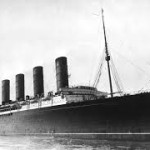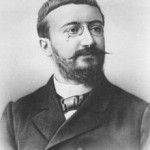Lusitania
The Lusitania made her maiden voyage in 1907. Having been built to be the fastest liner afloat, she was nicknamed the “Greyhound of the Seas”. Unbeknownst the general public, the British admiralty had subsidized her manufacturing with the proviso that she would be later be consigned to government service. With the war looming in 1913, she was fitted with ammunition and gun mounts which were concealed under the deck.
In 1915, she left New York for Liverpool. While those unboard were unaware, the Germans were onto her secret arms. As she neared the coast of Ireland, a torpedo from the German uboat U 20 struck her. Another explosion on board ripped the liner apart. As the ship listed badly, lifeboats struck passengers trying to board them. The giant ship sank in eighteen minutes, killing 1,119 of the 1,924 on board (the total included 114 Americans).
In the ship’s nursery, Alfred Vanderbilt, of the famously rich American family, and playwright Carl Frohman desperately tried to save the infants on board by piecing together life jackets as miniature life boats for them. All of this was to no avail – none of the infants survived, and both Vanderbilt and Frohman perished as well.
American public opinion was enraged. Not surprisingly, the fallout was immediate and widespread. President Wilson issued strong protests to the Germans. William Jennings Bryan, the Secretary of State, who was also a pacifist, resigned as a result. American antipathy towards the Germans had grown to dangerous proportions. Within two years, America declared war.
Psychologist Alfred who invented the intelligence test
Alfred Binet was a French psychologist who invented what became the first intelligence test. The initial purpose of his test was to identify students who would struggle with the traditional curriculum, not test who was a genius or not.
During his early years after law school, Binet studied the memories of ches s players and then studied the effects of hypnotism under Jean-Martin Charcot. Never attaining a major position with a university, his career had more or less stalled, when in 1899, he was asked to be a member of the Free Society for the Psychological Study of the Child. French education had changed over the years, and it was now mandatory for children ages six to fourteen to attend school.
s players and then studied the effects of hypnotism under Jean-Martin Charcot. Never attaining a major position with a university, his career had more or less stalled, when in 1899, he was asked to be a member of the Free Society for the Psychological Study of the Child. French education had changed over the years, and it was now mandatory for children ages six to fourteen to attend school.
With the help of a medical student, Theodore Simon, Binet developed a test for measuring intelligence, called the Binet-Simon scale. The scale was used to represent tasks typical of children’s abilities at various ages. In a practical sense, the scores revealed the child’s mental age. Binet believed that intelligence was diverse and responsive to environment and not just based on genetics.
Lewis Terman took the Simon-Benet scale and standardized using an American sample. Despite Binet’s initial purpose to advocate education for all children, the test was used in “curtailing the reproduction of feeble-mindedness and in the elimination of an enormous amount of crime, pauperism, and industrial inefficiency”.
That Binet did not speak out against the use of his name and test in such a manner seems implausible, but he was somewhat of an isolationist and never traveled outside of France and seldom participated in professional organizations. His test did not receive the same attention in France and did not have the same results.
He continued to study children throughout his life, and in his honor the Free Society for the Psychological Study of the Child was renamed La Societe Alfred Binet in his honor.
Mother of Perseus
Watch Jeopardy! with any regularity, and you will know that Greek mythology is a frequent category and with good reason. Greek and Roman mythology have existed for centuries, inspiring stories and artists of all kinds.
Danae was a princess of Argos in the Greek Peloponessos, a daughter of King Akrisios. When her father learned from a prophet that he would be killed by a son of his daughter, he did the only thing he could: he locked Danae away in a subterranean bronze chamber. However such a prison was no match for Zeus who impregnated her in the guise of a golden shower.
 Once he learned of this, Akrisios had both Danae and her son, Perseus, placed in a chest and set them afloat on the sea. Through the intervention of various deities, they landed safely on the island of Seriphos where the fisherman, Diktys, brought them ashore and into his home.
Once he learned of this, Akrisios had both Danae and her son, Perseus, placed in a chest and set them afloat on the sea. Through the intervention of various deities, they landed safely on the island of Seriphos where the fisherman, Diktys, brought them ashore and into his home.
In an effort to thwart King Polydectes’ proposal of marriage, Perseus brought back Medusa’s head and rescued Andromeda. He started for Argos, but after hearing the prophecy, went instead to Larissa where athletic games were ongoing. By chance, Akrisios was there and Perseus accidentally struck him on the head with a javelin – fulfilling the prophecy.
